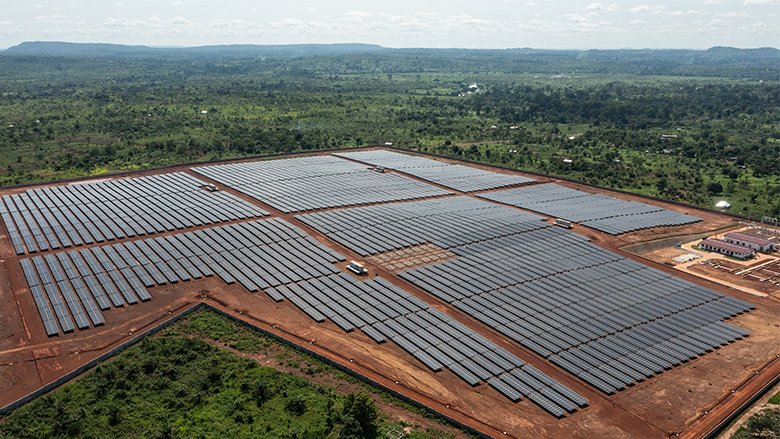BANGUI, November 17, 2023 – Today, the Central African Republic is launching a new 25-megawatt solar park with battery storage in Danzi village, located around 18 kilometers from Bangui. The park will supply electricity to 250,000 persons in the capital, almost doubling the country’s electricity generation capacity.
Officially inaugurated today by President Faustin-Archange Touadera and Ousmane Diagana, World Bank Vice President for Western and Central Africa, the Danzi solar plant underlines the country’s commitment to reducing its dependence on fossil fuels and to increasing its use of less costly renewable energies in its drive to promote sustainable development.
With an electrification rate of 35% in Bangui, 8% in the main provincial cities and towns, and only 2% in rural communes, the Central African Republic has invested in the energy sector as an engine of development to increase access to electricity and promote sustainable growth.
“Danzi is only the start of our journey to provide universal access for all Central Africans to clean, high-quality energy, as we seek to promote economic recovery and the sustainable development of our country,” noted President Faustin-Archange Touadera. “This is a transformative project that touches all aspects of the life of our people, from providing electricity to households and lighting in schools and hospitals, to refrigeration and increased electricity access for both small businesses and large industries in Bangui.”
The Danzi solar park is the product of a partnership between the government and the World Bank and was made possible by grant funding from the World Bank’s International Development Association (IDA). The grant financing builds on the achievements of the Emergency Electricity Supply and Access Project (PURACEL) and the Water and Electricity Upgrading Project (PASEEL).
“Energy is a vital artery of the economy. Thanks to this project, health centers, schools, and businesses will have increased access to electricity, and this will enhance productivity and promote job creation,” said Ousmane Diagana, World Bank Vice President for Western and Central Africa.
The plant will replace over 90% of the energy currently produced by diesel fuel, while generating more than $4 million per year for the National Electricity Company. It will also contribute to a net reduction of emissions of 670,674 metric tons of CO2. This is in addition to the support for the development of the electricity sector through the Electricity Sector Strengthening and Access Project (PARSE), which is designed to promote electrification outside the capital city by implementing mini-grid projects and distributing solar kits to households, public bodies, and businesses.
The Government enabled the achievement of the project's objectives through facilitation mechanisms in the form of national counterparts (industries, subsidies, land and others). The effective implementation and monitoring of the operation by the Ministry of Development, Energy, and Hydraulic Resources alongside the World Bank was key to achieve this result.
This project investment is the first of many designed to develop clean energy in the country, including large-scale solar energy, mini-grids, and off-grid solutions for households and public bodies. By 2030, almost half of the population of the Central African Republic should have access to electricity, compared to only 16% at present.

